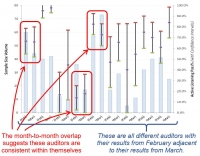A telecommunications company terminated a $15M/yr contract with a self-proclaimed “Six Sigma” vendor when it was statistically proven the vendor used biased and inconsistent methods to audit their customer service calls. The vendor’s inconsistent data collection methods meant their data and any analysis on their data were unreliable and irrelevant.
In February 2017, Amazon announced a “BIGTHANKS” coupon saving $8.62 on any order of $50 or more. Why such an odd amount? It’s because they ranked the highest in a “Reputation Quotient” from the Harris Poll of 86.2%. Amazon may be great, but are they statistically the highest?
In June 2016 the Wall Street Journal printed an article describing a lawsuit against the Internal Revenue Service (IRS), a United States government agency responsible for tax collection and tax law enforcement, including the designation of what organizations are tax-exempt. In this case study, we'll see how some simple statistical analysis could either help save or incriminate the IRS in this lawsuit. This study explores the use of data collection and the Two Proportions Test.
Before You Hire a Black Belt...
Written by Matt HansenHow do you know if the Lean Six Sigma (LSS) Black Belt you're hiring is really qualified? Many training organizations make it too fast, cheap, and easy to get a LSS certification that it's become very difficult for recruiters and hiring managers to know which candidates are qualified. And candidates who really are qualified in LSS find it difficult to get noticed among the masses. To solve this, StatStuff offers an assessment to ensure the truly outstanding LSS candidates really stand out.
There are so many organizations offering training and certifications in Lean Six Sigma (LSS), how can you tell which one is best, or at least best for you? For a methodology like LSS that's intended to standardize and simplify business processes, it's natural to expect that to also apply to training and certification - but unfortunately that is not the case. No two training organizations are alike in their cost, duration, content, requirements, etc. So although there's no organization that can be called the "best", there are a few ways to help you sift through the many choices and hopefully find which ones are best for you.
Most training organizations design their Lean Six Sigma (LSS) training around the type of certifications they offer. But each person has unique experiences and different needs; some may only need a quick introduction to LSS, others may want to learn only certain parts to complement their existing knowledge, while others may want all the complex details to get certified. Shouldn't LSS training accommodate the various needs of these different students? StatStuff's unique and dynamic training format not only does that, but it's the only high-quality and highly endorsed training of its kind that is completely free.
That's right, by using the StatStuff training resources in your organization's training program, you can not only save time and money, but it's much more flexible for your students too. Besides, it's the perfect way to demonstrate the value of Lean Six Sigma (LSS) by applying the LSS concepts to your own LSS training program.













